by Dr Charles Margerison
Psychologist – Amazing People Worldwide
Henry Ford, Coco Chanel, Andrew Carnegie, Cesar Ritz, Elizabeth Arden, Mayer Rothschild are all examples of people who started from humble circumstances and became multi-millionaires. How did they do it? What can we learn from their lives? How did they succeed?
We can learn from their actions and success, but we cannot replicate what they did. They were a product of their time and their personality fitted the opportunities they discovered. No doubt, if they were to return today, most of the entrepreneurs mentioned would be successful. But the social conditions have changed, and they would have to adapt their approach. Therefore, a key learning point is that you need to look at the opportunities in the context of the social situation.
Here are the factors that I have identified which were important and which we need to adapt to, rather than try to replicate them.
There are a number of entrepreneurs who were born into poor families. They were able to break out and find ways to accumulate wealth. To do so, they invariably moved to a new town or new country.
Andrew Carnegie is a classic example of a person who made a success in a new environment. Having been born to a relatively poor family in Scotland, he found fame and fortune when his family took him to the USA. When he was 13 years of age his parents emigrated from Dunfermline, a small town in Fifeshire. By the age of 35 he was able to retire and become a philanthropist.

Another example was César Ritz. He was born high in the Swiss Alps to poor parents who farmed the land. In his young days, he was a shepherd for the family goats. When he was 16 years of age, he travelled down from the mountains and found his way to Paris. He quickly learned how to work and live in big city hotels. More than that, he built a reputation as a hotelier with a brand name that still projects ‘quality’ today.
It might be assumed that children who did not have strong family support would be at a disadvantage. That may be so in some cases, but not in all.

Coco Chanel was also born to a poor family and her mother died early. Coco’s father drifted away and she was left in the care of nuns at the local Catholic Church. They provided her with a strict upbringing and an education. Once she was 18 years of age, she developed what some may call a bohemian way of life, which she combined with a talent for entrepreneurship.
Another example was Hans Wilsdorf, the founder of Rolex. His world was shattered when both of his parents died before he was even a teenager. Despite the shock, he was able to develop a plan of action. It was no use going back to the town where he was born so he travelled in search of work. Eventually he learned how to be a merchant watchmaker and made the Rolex brand famous. He also learned how to speak French and English en route, as he built up the famous watch-making company.
It is usually assumed that for a person to succeed, they needed to be fluent in the language of the country in which they did business. There are examples where this was not the case.
Michael Marks walked over 1000 miles from Slonim in the Ukraine to Leeds, England. He did not speak German or French, or the languages of the other countries though which he travelled. He did not speak English when he arrived in the UK. Nevertheless, he went out each day selling in the markets and door to door. He started with a sign, ‘Don’t Ask The Price, It’s A Penny.’ It was a simple message that helped him communicate. He managed to build up a successful business which still carries his name today.
These are just three barriers that entrepreneurs succeeded in overcoming. There are other interesting factors that have influenced people’s success which we have deduced from the study of those people referred to in this book and other entrepreneurs who we have reviewed in the process.
Various people have asked why some people were successful in business while others were not. Here are some examples which show the following to be important.
1 – Determination
Each of the entrepreneurs knew people who expressed doubts or told them they would not succeed. Despite those opinions, they continued on with what they felt was right.
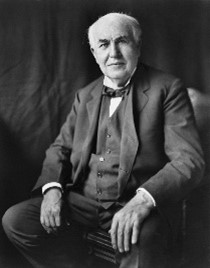 Thomas Edison said that success in business was one percent inspiration and ninety-nine percent perspiration.
Thomas Edison said that success in business was one percent inspiration and ninety-nine percent perspiration.
He would have known because he was severely deaf and had little formal education. At the age of 13, he had left home and was earning his living on the railways. Thomas Edison’s initial efforts did not succeed, but he kept on going and found the way to build up one of the world’s greatest organisations through the application of his technical insights and hard work.
Madame CJ Walker had many barriers and disappointments in her early life. Her parents died and then her husband. Despite her own health problems, she put her mind to building a business. By hard efforts she succeeded in building a hair care and beauty business. She proved that being the daughter of slaves would not stop her achieving her goals. Determination to overcome obstacles is a key factor in success.
2 – Opportunity
Winston Churchill said that many people stumble across opportunities. Then, they pick themselves up and go about their business as if nothing has happened.
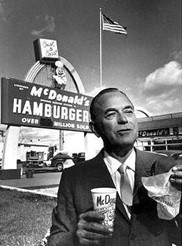 Entrepreneurs, in contrast, usually see and seize the opportunities in selected fields where they seem to have a sixth sense. Ray Kroc, who developed the McDonald’s hamburger chain, had an eye for business opportunities. Long before he built up the McDonald’s organisation, he identified a number of other business opportunities, particularly in the technology of fast-food services. Maybe it was not surprising that when he saw the McDonald Brothers Restaurant, he could envisage how he could take the idea around the world. Recognising opportunities and seizing chances were key factors.
Entrepreneurs, in contrast, usually see and seize the opportunities in selected fields where they seem to have a sixth sense. Ray Kroc, who developed the McDonald’s hamburger chain, had an eye for business opportunities. Long before he built up the McDonald’s organisation, he identified a number of other business opportunities, particularly in the technology of fast-food services. Maybe it was not surprising that when he saw the McDonald Brothers Restaurant, he could envisage how he could take the idea around the world. Recognising opportunities and seizing chances were key factors.
George de Mestral saw that burrs stuck to his dog and thought it was an idea that could lead to a product, which he called Velcro and Elizabeth Arden recognised that women in the new age, wanted to feel and look good and created outstanding products.
Entrepreneurs all perceive what can be done with an opportunity, and then they make it happen.
3 – Investment
Many people have ideas and are not willing, or able, to find the funds to invest in them. Entrepreneurs find the funds one way or the other. Often they run short of cash, as the idea is bigger than their bank balance. The ones we never hear of again fail on the financial side, not because their idea was wrong.
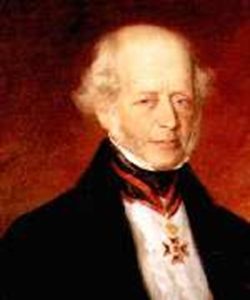 Mayer Rothschild built his business by finding money and lending it out to people for an interest payment. His financial house has become world famous. In the process, it has supported many entrepreneurs as the larger the idea the more funds are required to get it going before income is generated.
Mayer Rothschild built his business by finding money and lending it out to people for an interest payment. His financial house has become world famous. In the process, it has supported many entrepreneurs as the larger the idea the more funds are required to get it going before income is generated.
Entrepreneurs therefore have to calculate the cost of funds today against future income. People like Helena Rubinstein found the secret. She built up her worldwide business from scratch after she arrived as an immigrant to Australia from Poland. She did not let the prevailing attitudes of the day affect her approach to business.
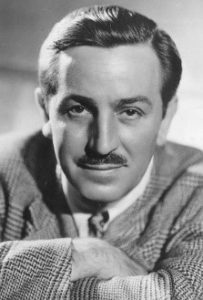 Another example was Walt Disney. He is recognised as an entrepreneur who made his dreams come true. It was not like that when he started. His first two companies closed because they ran out of money. He succeeded when he teamed up with his brother, Roy Disney. It was Roy who organised the funds and managed the business affairs to keep the company solvent. There were many occasions when the ideas ran ahead of the money and it was a close-run thing.
Another example was Walt Disney. He is recognised as an entrepreneur who made his dreams come true. It was not like that when he started. His first two companies closed because they ran out of money. He succeeded when he teamed up with his brother, Roy Disney. It was Roy who organised the funds and managed the business affairs to keep the company solvent. There were many occasions when the ideas ran ahead of the money and it was a close-run thing.
Of course, many entrepreneurs need funds from banks, private investors and the stock market. Although they may not have had training in how to acquire funds they learn how to do it from experience. It is a key factor that distinguishes those that survive from those that do not.
4 – Time Management
The old expression that time is money is true when it comes to entrepreneurs. They used their time exceptionally well. Moreover, they organised the time of other people well also.
Lillian Gilbreth is an outstanding example. Her husband, Frank, developed a successful business. Sadly, he died when Lillian was only 46 years of age. They had 12 children. It would have been easy for Lillian to say that she was too busy bringing up her family and that she did not have time for business. Instead, she took on the development of the organisation. The key service she provided was on time and motion studies, which improved productivity, profit, safety and efficiency. Also, she wrote a number of classic books on management and the psychology of work. Her great skill was to use time well and put the principles of time and motion into practice in developing herself as an entrepreneur.
Other entrepreneurs find ways of using their time well. They find out how to do something, then delegate it and go to the next challenge.
5 – Values
It is often assumed that entrepreneurs are so focused on making money that they put that before all else. There are examples of people who were so-minded. However, many entrepreneurs have strong values and they use the money they generate to fund value driven initiatives.
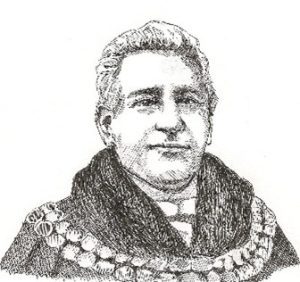 William Lever built the community of Port Sunlight in the late 19th and early 20th Centuries. It has become an outstanding example of how successful entrepreneurial work can help improve living standards. Lever built a school, public swimming baths, a church, a library, sports ground, and an art gallery, all within a magnificent village where he provided houses for his workers.
William Lever built the community of Port Sunlight in the late 19th and early 20th Centuries. It has become an outstanding example of how successful entrepreneurial work can help improve living standards. Lever built a school, public swimming baths, a church, a library, sports ground, and an art gallery, all within a magnificent village where he provided houses for his workers.
There are many other examples, such as Titus Salt at Saltaire, Cadbury brothers at Bourneville and Rowntree in York. All the entrepreneurs who did this had strong views on the stewardship of the money they gained and how it could be used to help others and provide education for the next generation.
6 – Networking
This is a popular concept today, and reflects the way that business is often built on strong personal relationships. Trust is a vital factor and businesspeople put a lot of trust in the judgement of others, even though they may only have known met them for a short time. While it was more difficult to travel in times past, the importance of networking was still there. A number of successful entrepreneurs took positions in their professional bodies.
George Stephenson, of railway fame, also took a leading role in his professional organisation. He was the first President of the Institute of Mechanical Engineers. Other entrepreneurs contributed to their local communities, serving as a mayor or other elected office. Some, like William Lever, became elected politicians for a while. It showed that they valued the wider influence they could have and, in so doing, exercised their networking skills to further develop their business.
7 – Education
Few of the early entrepreneurs had formal qualifications related to business. There are few accountants or lawyers in the list of the all-time greats. Most of the entrepreneurs seemed to have learnt by ‘doing’. The social conditions, until recently, favoured men in the entrepreneur’s role. There were a few women, like Beulah Henry and Helena Rubinstein, who enjoyed the cut and thrust and risk of business. It could be said they had an intuitive feel for what was required.
Entrepreneurs read the market trends well in various ways. They read employees and the needs of customers well. Some, like Carnegie, read books, but very few read business books. Indeed, they would have regarded the idea of taking one or two years at a business school to study management with laughter. Their view was that business itself was the laboratory. Practical on-the-job study, not case studies and theories, was the way they succeeded.
It could be said that we are only dealing with the successful ones. But, that is the point. The successful ones read the trends, rather than books, very well. However, as one famous entrepreneur said, he had advisers that read the books and they summarized the main points for him. It could be said that without formal training, many entrepreneurs knew how to keep ahead of the game and could envisage what was required.
8 – Distribution
All the entrepreneurs were able to keep ahead of the market curve. They may not have invented the product or service, but they knew how to distribute them.
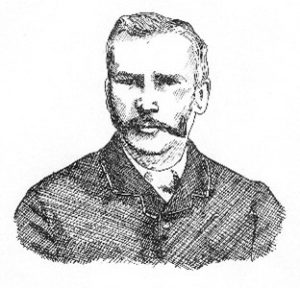 Jesse Boot is a good example. He took over the retailing of herbs from his family. It was a business that his father and mother had founded. His great skill was to expand the business to many towns in the UK. He put distribution systems in place that were innovative in the context of the days when the railways were just starting, and changing the face of business.
Jesse Boot is a good example. He took over the retailing of herbs from his family. It was a business that his father and mother had founded. His great skill was to expand the business to many towns in the UK. He put distribution systems in place that were innovative in the context of the days when the railways were just starting, and changing the face of business.
When you look at all entrepreneurs the one thing they had in common was that they established excellent distribution systems which were the basis of their sales, revenue and profit.
9 – Personality
This is the one factor that continually shines through. Each of the entrepreneurs had a personality that enabled them to take high risks, work long hours and find ways around problems when there was no road map. Yet, it is hard to point to a specific personality profile. Some were more extroverted, and some more introverted. Some were very practical and others driven by their creative ideas. Some were analytical, and others followed their beliefs. If they had anything in common, it was the ability to structure their own work and that of others to achieve objectives. Henry Ford is a classic example of a man who knew how to build an organisation based on the division of labour and make it run like clockwork. They also had the ability to judge other people’s personalities in terms of appointing people to work with them. In that sense, they were practical psychologists.
10 – Business Skills
Clearly, the entrepreneurs learned the financial, the production, the marketing, the distribution and other aspects of their business. In my work, we have noted that this requires a communication and problem-solving approach that moves from problems to solutions and from discussions to decisions. There are five key skills to achieve this and the entrepreneurs studied used all of them.
11- Team Management
Entrepreneurs did not do everything alone. We tend to celebrate the individual and we should learn from them. One thing that they did well was to build and manage teams of people. All the people I have mentioned had that ability. People like Edison, Ford, Ritz, Lever and others, established organisations where they employed and managed thousands of people. It is easy to say and hard to do.
My research in this area led to the development of Team Management Systems. My work with colleagues shows that there are nine key work areas: innovating, organising, promoting, developing, producing, inspecting, advising, maintaining and linking. Entrepreneurs, who survived, learnt how to develop people who could work effectively together in those areas.
12 – Purpose
Amazing achievers all identified a purpose that guided their efforts, particularly those who were successful in business. In addition, it is important to recognize those who identified their purpose with social needs:
It is important to help young people to understand their purpose, as a way of choosing a career. Rather than choosing a job, young people need to choose a purpose that will motivate and inspire them each day.
Overview
The great entrepreneurs carved out opportunities in days when communication was slower than it is today. They developed products and services, but most of all they developed distribution facilities. In that way, they gained some control over their business and its development.

Dr Charles Margerison, President and founder of Amazing People Worldwide, is a Psychologist. He is also President of Amazing People Schools. Dr Margerison has consulted widely for major organizations in the fields of organizational and educational psychology. He was previously Professor of Management at Cranfield University, UK, and the University of Queensland, Australia. He founded Amazing People Worldwide in 2006 and is supported by a dedicated global team. He previously co-founded Emerald Publications, and Team Management Systems and has authored more than 30 books. Dr Charles is also the creator of ‘Can Do Kids Worldwide, a virtual music group that helps students to learn about countries and cultures through music. He has also developed Imagineland, for early learners. You can follow him on Linked in .
For more information, please email info@amazingpeopleworldwide.com
Websites:



Copyright © 2021. Amazing People Worldwide.
All Rights Reserved.
This site is protected by reCAPTCHA and the Google
Privacy Policy and Terms of Service apply.



